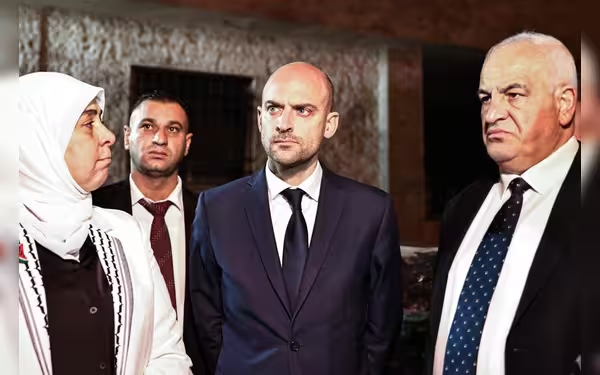Saturday, November 16, 2024 07:39 PM
France Considers New Sanctions on Israeli Settlers in West Bank
- France plans new sanctions against Israeli settlement facilitators.
- French Foreign Minister emphasizes commitment to two-state solution.
- Settler violence threatens peace efforts in the region.
 Image Credits: arabnewspk
Image Credits: arabnewspkFrance is considering new sanctions on Israeli settlers in the West Bank, emphasizing the need for a two-state solution amid ongoing violence.
In recent developments, France is considering implementing new sanctions against individuals and entities that facilitate the expansion of Israeli settlements in the occupied West Bank. These settlements are widely regarded as illegal under international law. French Foreign Minister Jean-Noel Barrot made this announcement during his visit to the West Bank, emphasizing France's commitment to addressing the ongoing issues surrounding the Israeli-Palestinian conflict.
During his discussions with Palestinian President Mahmud Abbas in Ramallah, Barrot highlighted France's role as a pioneer in establishing the first sanction regime at the European level. This regime specifically targets those involved in settlement activities, whether they are direct actors or accomplices. Barrot stated, "France has been a driving force to establish the first sanction regime at the European level targeting individuals or entities, either actors or accomplices of settlement activities." He further noted that this regime has already been activated twice, with efforts underway for a third round of sanctions.
Barrot reiterated France's dedication to a two-state solution, which aims to provide a peaceful resolution to the Israeli-Palestinian conflict. He warned that ongoing settlement activities pose a significant threat to the political landscape necessary for achieving lasting peace for both Israel and Palestine. He remarked, "These attacks from extremist and violent settlers are not only completely inexcusable, not only contrary to international law, but they weaken the perspective of a two-state solution."
Before his meeting with Abbas, Barrot visited Al-Bireh, a town adjacent to Ramallah, where Israeli settlers had recently set fire to 20 cars, causing damage to a nearby building. This incident occurred in an area where, according to the Oslo Accords of the 1990s, Palestinians were supposed to have both civil and security control. Barrot's visit to the site allowed him to speak with local residents and officials, who expressed their frustration over the ongoing violence.
Governor Laila Ghannam of Ramallah and Al-Bireh expressed her outrage, stating that settler attacks are happening "in full view and hearing of the entire silent international community." She expressed hope that Barrot's visit would bring attention to these issues, saying, "Perhaps today, with the visit of the French foreign minister, there will be a spotlight here."
In a related statement made earlier in Jerusalem, Barrot mentioned the potential for ending Israel's conflicts in Gaza and Lebanon, particularly in light of Donald Trump's re-election. He pointed to Trump's desire to conclude the ongoing wars in the Middle East and noted recent tactical successes for Israel.
The situation in the West Bank remains complex and fraught with tension. As international attention turns to the actions of Israeli settlers and the broader implications for peace in the region, it is crucial for the global community to remain engaged and advocate for a resolution that respects the rights and aspirations of both Israelis and Palestinians. The path to peace is undoubtedly challenging, but with continued dialogue and commitment from all parties involved, there is hope for a brighter future.













